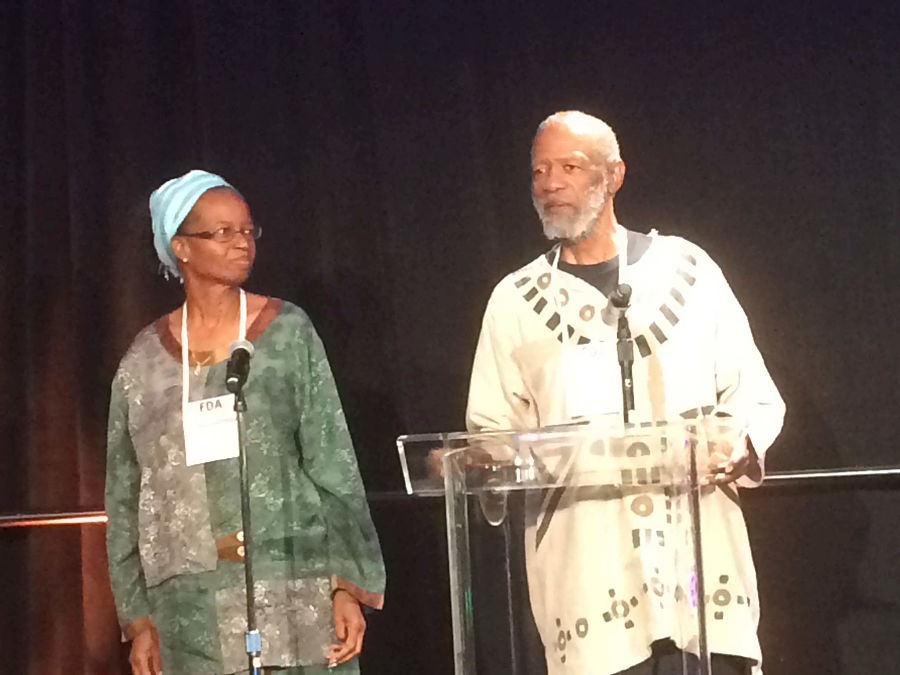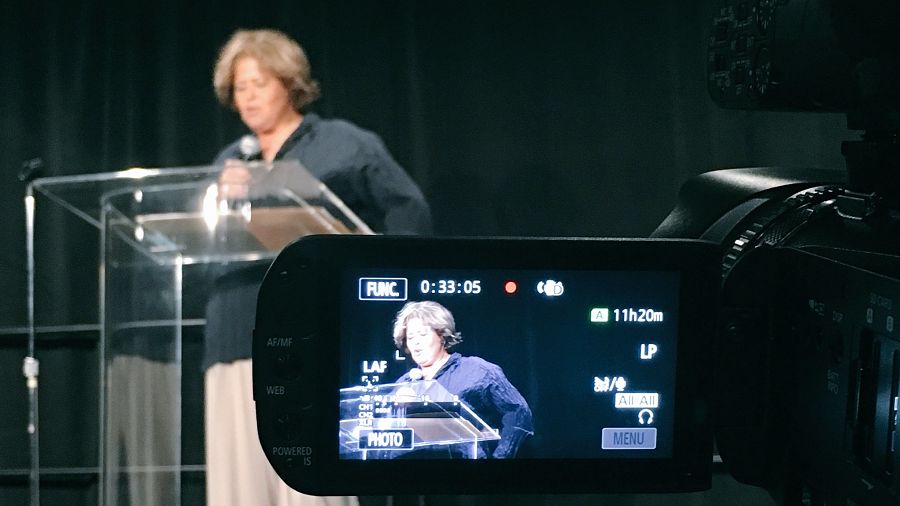WASHINGTON, D.C.: This week the U.S. witnessed the latest in a string of struggles with who we are and what we stand for—or sit down for, as the climax came with a momentous sit-in on the floor of the House of Representatives in protest against the lack of gun-control legislation in the wake of the Orlando shooting that targeted queer people of color.
This year also marks the 20th anniversary of playwright August Wilson’s seminal address on race and theatre, “The Ground on Which I Stand,” presented 20 years ago this month at Theatre Communications Group’s national conference. At the opening plenary of TCG’s gathering in the U.S. capital on Thursday, a conference titled Theatre Nation, these issues filled the room.
In her introductory remarks TCG executive director Teresa Eyring welcomed attendees and noted what had taken place so far at the conference, such as a global pre-conference session, work with the organization’s Equity, Diversity & Inclusion Institute at the National Endowment for the Arts, plus an impromptu visit to the House that morning in which a group caught the final portion of the sit-in. Eyring described how that cohort got into the room where it happened: “Just when it looked like they’d never get in, a guard said that if they could assemble a group of 20 or more people, she’d bring them up,” Eyring noted. “So they did what theatre people do best: They rallied a group of strangers into a community, and the guard brought them in to witness the last 35 minutes of the sit-in.”
There, Eyring explained, they heard the closing words of civil rights icon Rep. John Lewis: “We got in trouble. We got in the way. Good trouble. Necessary trouble. By sitting in, we were really standing up.”
The legacy of civil rights persisted through the rest of the session. The Visionary Leadership Award went to John O’Neal, a founder of social-justice troupe the Free Southern Theater and its offshoot, New Orleans’s Junebug Productions. O’Neal took the stage, and the attendees gave him an enthusiastic standing ovation. When he came up to the microphone, the room of more than 1,000 went completely quiet for the first time that evening. He expressed his gratitude, then said simply, “Let us all make a commitment to keep on working harder and getting stronger. Thank you very much.” The cheers resumed, and he received another standing ovation as he went back to his seat in the audience.

Eyring then returned to reflect on August Wilson’s “Ground,” suggesting a parallel between Wilson and a speaker 20 years earlier at TCG’s first conference in 1976, who also confronted issues of oppression and poverty. An individual who, like Wilson, would be accused of separatism by critic Robert Brustein: That speaker was John O’Neal.
An audio excerpt of Wilson delivering his 1996 speech followed, creating the second hushed silence of the night, and that section of the program led into the keynote address by Anna Deavere Smith, the writer and performer who moderated a famous debate about the speech at New York City’s Town Hall between Wilson and Brustein. She recounted how that event came about, explaining that, upon learning that the two individuals hadn’t talked to each other throughout their back-and-forth in the pages of American Theatre, she wished to get them in a room together. Smith pointed out that she was inspired by “Rap on Race,” a 1970 conversation between the white cultural anthropologist Margaret Mead and the black author James Baldwin. In her trademark verbatim performance style, Smith inhabited the figures of Mead and Baldwin in reenacting parts of that seven-and-a-half-hour talk.
The remainder of Smith’s time wove together anecdote, performance, and commentary in an invigorating call to action for theatre to become ever more inclusive as a means of improving the world. “Those of you who were moved, are moved, must move,” she said, referring to Wilson’s speech. “A move-ment calls for many movers, shakers, and seekers. All that we can attract.” Taking Wilson’s “Ground” and its legacy as a jumping-off point, Smith channeled black individuals such as Baldwin; Rep. John Lewis; and Allen Bullock, a teenager arrested for his involvement in protests in Baltimore in reaction to the death of Freddie Gray. The latter is part of the latest piece Smith is developing through extensive interviews, in which she’s examining the “school to prison” pipeline, and about which she said hopefully, “We may be on the verge of a new civil rights movement at the intersection of education and law enforcement.”
To join that effort, though, we must acknowledge the various places from which we come. “We all meet here with different histories. Different banners of struggle,” Smith said. “We meet at different junctures in our histories. We are a map with some intersecting points, and many stray lines in search of a connection. Most of us want to board the train toward progress, equity, self-fulfillment, helping fulfill the lives of others toward protecting all living things and toward love.” She observed that before African Americans suffered on this ground, Native Americans faced displacement and violence. Noting ways people in the U.S. face discrimination differently now than two decades ago, based on factors such as country of origin, gender identity, sexuality, and religion, she commented, “Our ground is complex, also because 20 years have passed” since Wilson’s speech and the subsequent debate.
Referencing Wilson’s point about the dearth of black companies in the League of Resident Theatres, Smith quoted recent statistics from the DeVos Institute of Arts Management on the lack of diversity in arts leadership, and wrapped up the night by detailing her vision for an ideal theatre community. “Develop a spirit of hospitality, of radical hospitality—[philosopher Jacques] Derrida gives the best definition: ‘Let us say yes to who or what turns up, before any determination, before any anticipation, before any identification, whether or not it has to do with a foreigner, an immigrant, an invited guest or an unexpected visitor, whether or not the new arrival is the citizen of another country, a human, animal, or divine creature, a living or dead thing, male or female.’” She closed with this summary: “Develop a radical hospitality toward one another, toward all of us in our wonderful profession, toward the global public on whose ground we stand.”


